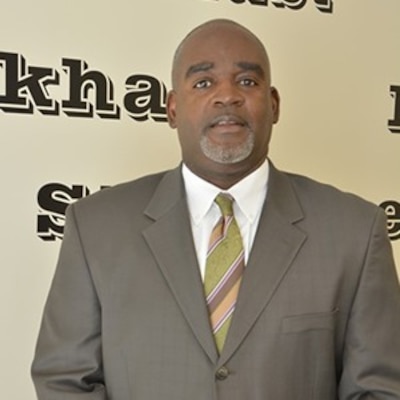In his first months on the job, Andre Wright has often heard the relationship between the Adams 14 school district and MGT Consulting described as a “forced marriage.”
It’s true that the relationship between the private management company and Adams 14 is struggling, Wright said, but MGT’s new top manager for Adams 14 said he’s committed to making the relationship work, for the sake of the children.
“If we put students first in everything that we do, we will make the right decisions,” Wright said in an interview with Chalkbeat that touched on his top priorities for the school year.
Wright previously served as the chief academic officer for Aurora Public Schools, a diverse 38,000-student district. His appointment in Adams 14 marks yet more turnover in the struggling district. This school year, the district also started with a new superintendent.

The two have struggled with sharing responsibilities, but have told the State Board they are trying to comply with state orders to work together.
Colorado’s state orders stripped Adams 14 of its daily management — mainly taking away the superintendent’s role, and handing it to a private company. But because of Colorado’s philosophy of having strong local control, the state also allowed the local elected school board to retain ultimate control. Just last month, the board received a financial audit on MGT’s payments and contracts, something its new superintendent suggested they commission and pay for. But the board has not shared it with MGT or with the public.
Superintendent Karla Loria said this week that she welcomes working with MGT.
“I remain firmly committed to that goal of thoughtful and accountable collaboration as a means to transform academic opportunities and outcomes for the children of Adams 14,” Loria said.
Below, read Wright’s own words about his views on his role, his priorities, and his challenges.
About him and his top priorities:
I’m a teacher by heart. That’s what I am. I’m a product of two educators.
Adults have to start putting children first. If we put students first in everything that we do, we will make the right decisions. It does not mean I won’t make decisions that may not be as popular with adults, but I’m doing it from a student perspective of what’s best for our children, what’s best for our families. That’s priority one for me.
We have a great opportunity in Adams 14 to change the narrative if we can get ourselves to behave, but we have to start focusing on children and what the data says. Anyone you can talk to about me will tell you, “he has a student-first approach, he’s going to ask for solutions and not just problems.”
Culture and climate was the No. 1 focus point for the work — changing the culture and climate in the central office and at Adams City [High School]. There was a big effort put forth to change some of those outcomes and I recognize that. I also think that everyone would say, now that you have some of those things in place, how do you double down on student achievement outcomes? Maybe that was the catalyst for them engaging me in this transition.
On his “forced marriage” and whether MGT or Adams 14 Superintendent Karla Loria gets to make decisions:
We don’t have the type of relationship that I think can move things right now. When you hear [that] this is a forced marriage, there’s no trust, all the negatives, and I’ve been there 51 days, how do you build from that? What I’m offering is the opportunity to behave in the opposite. So that makes it difficult for anybody in my position. It doesn’t mean the work can’t be done. It still has to happen.
If [the board] believes they have someone that makes all the decisions and someone else says, “Wait a minute. there’s an organization that makes the decisions,” those are two different perspectives. From our perspective, two-thirds [of the parties, meaning MGT and the Colorado Department of Education] are on the same page about this.
On how the pandemic has impacted the focus of the work for this year:
The key is how you respond as an organization, as a system, as a district and as leadership. You have to have people who know how to do that first, so that you don’t artificially create gaps on the back end as you’re trying to fill a gap, as teachers are trying to accelerate children. You have to have skilled individuals that can do that. That’s not a job that you just hand out. You have to be able to do that level of work so that you don’t create an even bigger issue a year from now. That’s where in my mind a huge focus of ours needs to be. We have to accelerate.
On what he believes is a reachable goal before the end of the school year:
This plan for professional learning will be aligned — through principals, through coaches, through teachers, all the way through what happens with students. Because we’ve been very, very intentional about making sure principals aren’t learning something that coaches aren’t teaching to teachers. That teachers aren’t learning something that principals are not aware of. So when they show up in a classroom in either capacity they’re on the same page. By doing that, we can build on outcomes for every school in the district.






